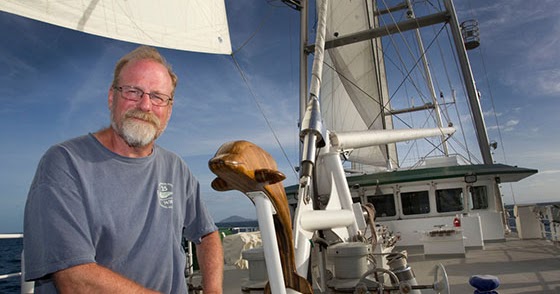Report by Dr David Robie – Café Pacific. – 
A tribute to STEVE SAWYER by former Rainbow Warrior captain PETER WILLCOX, who was skipper at the time of the Rongelap evacuation and the bombing in 1985.
I MET Steve in 1981 in New Bedford, Massachusetts, on the first Rainbow Warrior. I was answering a job advert he had placed in the National Fisherman. We spoke in his cabin for a while, and then went to the mess to meet the crew.
One of the things Steve liked about the manager’s job on the RW was that he got to do real physical work as well as intellectual organising. The crew was all giving him a hard time about his painting technique. It seems the day before, Steve, while climbing down into an inflatable (not a rhib by a long shot), had stepped directly into a five-gallon bucket of paint.
That he took the ribbing good-naturedly and laughed with everyone else was to me an excellent sign of life on board that ship.
Steve was the first guy I ever worked for who was younger than I. I was 28, and he 25 in 1981. But I learned fast not to mess with him. He could argue you into a corner quickly, and he did not suffer fools.
A few months later, we were up in Maine, replacing the motor and generators with new diesels. And Steve was right in the thick of it. One time he was underneath the new 16-cylinder GM diesel, I think drilling a hole in the steel engine bed to run a fuel line. I can safely say that it was not an OSHA approved work site.
Steve was sitting on a 2 x 12 plank over a ton or so of diesel and motor oil, the engine room bilge. He was drilling with a 120-volt drill, and it was tough work. Then the drill stopped. He looked by down the electric cord, and saw that he had pulled the plug and socket into the oil. He quickly pulled it out and it burst into flame. He dropped it back in the diesel, and squirmed his way out from under the engine with rather a serious expression on his face.
First big campaign
Steve studied philosophy in college, and was a near All American baseball pitcher. I will explain the significance of this in a minute.
The first big campaign we did was a Canadian seal campaign. I mentioned Steve had studied philosophy in college. The campaigner, a Canadian whose name I will not mention (but his initials are P.M.), threw the I Ching many times during the campaign, mostly as a way to get me back to the bridge to push further and further into the ice. The first RW had no kind of ice class, or any kind of class for that matter. The year before with a fancy ice pilot on board, they had bent the propeller.
Every time the Canadian would throw the I Ching he would claim it said, “Go forward”. This would drive Steve crazy. I could see him cringing. And I know he never forgave the Canadian campaigner.
I’m sure Steve was the one who convinced the organisation to put sails on the first Warrior. I am not sure how he did it. But we built the masts, got the sails, cut the bridge wings off, made a bowsprit, did a lot of work in the engine room all for around $120,000 US. This was in the days when we did 90 percent of the work ourselves, before we would just pull into a ship yard and tell them to get busy.
The next campaign we did was also organised by Steve. It was the evacuation and resettlement of the people from Rongelap. Our mission that year, 1985, was to protest against nuclear testing in the Pacific. The first part of the trip was in the Marshall Islands, and Steve went out there in 1984 to see what we could do.
“Give us a ride”, he was told. And that’s how we moved 350 people 120 miles across the ocean with everything but their church and livestock. I am sure that many of my shipmates would agree that it was probably the most significant thing any of us ever did. I certainly feel that way. Thanks to Steve.
Fastball folly
It was during this campaign that I received a batch of Sports Illustrated magazines from home. I got into an article about a young baseball pitcher for the Mets named Sidd Finch, who could throw a fastball at a ridiculously high speed. After finishing the article, I ran down to the mess to show it to Steve.
Steve got about a quarter of the way through it, closed it, looked at the date, chuckled, and threw it back to me.
“Total bullshit” was all he said.
Steve immediately knew that no one could throw a baseball at 168 mph. He also caught that the article was written by George Plimpton, a founder of the Paris Review and a literary critic, not a sport journalist. The other clue was the date on the cover: April 1st, 1985. But that was Steve. Way smarter than the average bear.
It was a year to two before that that Steve met Kelly. They became, I think the best couple I have ever met, outside of Pete and Toshi Seeger. Both terrifically hard working and dedicated, to the environment and their family.
Steve went on to become an ED of both GpUSA and International, and I saw him less and less.
When I think about it now, he had an absolutely huge impact on my life.
Thank you, very very much, Steve.
This article was first published on Café Pacific.





